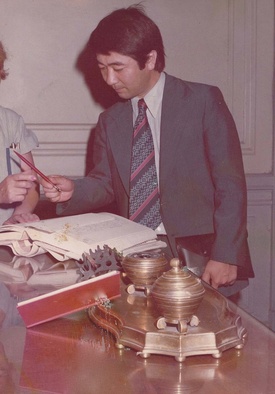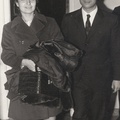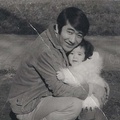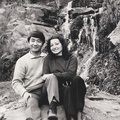Read part 1 >>
Labor lawyers
When he was fired from the metallurgical factory, Takashi consulted the law firm of Javier Slodky and Mario Garelik, located at 51 Maipú Street in Avellaneda. Both attorneys agreed with the advice Beba had previously given him. They advised my father to continue his studies at the university and that way he could collaborate better with the problems of the workers. My father finished college in a third of the time it took other students to complete law school. He received the double title of public notary and lawyer. While studying to take the exams, he worked as an associate at the law firm of Slodky and Garelik. The studio attended to consultations of thirty to forty workers per day. In the neighborhood the labor lawyers were known as the “boys who defend the poor” as Mario Garelik remembers. Slodky, Garelik and my father, in addition to being partners, shared a great friendship, they were like brothers.
The atmosphere in the studio was happy, there was never a shortage of laughter and good humor. One of the anecdotes that Garelik remembers is that of a client who came to the studio telling his problem. Javier Slodky, who wrote brilliantly (he wrote several books), wrote the telegram to send to the party in question. When the client went to the post office to send it, the employees told him that it was better for him to let himself be scammed because the telegram was going to cost more than the trial. The client once again told Javier what the postal employees had told him and then Takashi, who was there, told him that it was a telegram and not the complete works of Javier Slodky.
In 1974, times were dangerous in Argentina for those who defended the workers. One Saturday night in November, they heard the studio bell ring. They asked who it was and a voice responded that it was the police and that they had a search warrant. Mario Garelik looked through the peephole in the door and saw a group of eight or nine armed men, carrying Ithacas shotguns. They quickly decided not to open and escaped through the roofs. Without a doubt it was a death squad, a Triple A party, dedicated to murdering anyone who defended the interests of the workers, as was the case of labor lawyers.
Takashi, who was always very agile, showed them the best way to jump between the houses. From the roof of the studio they jumped to a rooftop, from there to a sign and from the sign to the sidewalk. Mario Garelik did not take the distance well and cut his hand. After more than forty years he still has the scar from that night. They ended up in a bakery on Miter Street. This period became chaotic, we didn't know what to expect, where to go, always with the task groups on the heels of my father and his partners.
My father used to buy a lot of books. A large part of our outings consisted of going to the bookstores on Corrientes Avenue. He said that the books were the inheritance that he wanted to leave to my brother and me. But since the assassin groups continued to press, my maternal grandfather, my mother and my father had to burn most of the “Oshiro library” as he called it. My mother told me that that day was very painful for my father, that his tears fell when he saw how the pages of so many works disintegrated. Some of the books that survived were the poems of Michelangelo Buonarroti, Neruda and some art volumes with works by Goya, Toulouse Lautrec, Gauguin and Leonardo Da Vinci. My father Takashi was right that this was the best inheritance, because even today I am moved by seeing works by those immortal artists.
The Studio had to face a second encounter in early 1975 with the repressive forces. The Argentine Anti-Communist Alliance did not give up its attempts. The second time they went to look for my father at the house of a distant cousin who had the same first and last name. They were confused because he was also a doctor, but in medicine. This man called my father to warn him of the danger. We spent several nights sleeping in relatives' houses. My mother, brother and I returned to our apartment. Javier and Takashi decided to travel by train to Necochea, it was night and I remember that we went to say goodbye to them at the Retiro station. When they returned, they spent another period in one of Grandpa Katsu's empty houses.
In November 1974, with the help of the staff of the Mexican embassy and Javier Slodky's girlfriend who worked there as a secretary, my parents, my little brother and I managed to enter there, we lived for a month while my parents did the paperwork to get political asylum in said country; Mexico.
They were chasing my father and my mother was 9 months old. As soon as she left the hospital on October 31, we went to the Embassy but she didn't feel very well. Mario Garelik arranged for the doctor to visit my mother. Mario told me that our families were like a big family and we even had the same dentists and doctors.
The Mexican Embassy was guarded from the outside by the Argentine military; entering was not as much the problem as getting out. Mario took Dr. Normandi (he was Garelik's, Slodky's and our family doctor) with fear of not knowing if he would be able to be free when he left or if they would take him away. But beyond the fear, the doctor decided to take a risk and check my mother.
The Mexican Foreign Ministry did not grant the status of politically persecuted Takashi, who abandoned his asylum request. That month that we lived in the Mexican Embassy was a period to meditate on what directions to take. My paternal and maternal grandparents did not want us to move away from them. My father was the eldest son in a Nikkei family, he occupied a very important place, beyond the fact that he was very loved by my grandparents and his sister Yoko. My mother was the most pampered by my maternal grandparents, and she also worked in my grandfather's textile company.
My mother always reminded me of my father's words, which always resonate like an echo in my head; “This is my country” and it stayed there for better or worse. My parents agreed that they were going to stay in Argentina and we lived respecting that decision.
The pressure exerted by Triple A had its consequences. In the office of Garelik, Slodky and Oshiro, the tide of workers consulting dwindled; The workers did not dare to do it out of fear and also because they prevented the clients from reaching the Studio. This climate made it impossible to work and so the three lawyers dissolved the company in 1976.
Dr. Enrique Gastón Courtade had a prestigious studio around the corner from the office in Avellaneda. He had a lot of work and upon hearing that Takashi was no longer working with Garelik and Slodky, he offered him membership. It seemed like things were back to normal; Courtade and my father worked together for more than a year, while representing in court more than a hundred workers fired by a company in the metalworking industry belonging to Martínez de Hoz. Courtade and my father were kidnapped on the same day: April 21, 1977.
As soon as Javier learned of Takashi's disappearance, he was in hiding for a few months looking for a way to leave the country. He got a scholarship to go to Peru, where he became a famous writer. In '77 he had already started a family with Miriam and they were expecting a girl named Judith. Javier left the country alone and later his wife and daughter did. Javier returned to Argentina with his family when we recovered democracy. We regained contact with them when we returned from Italy with my brother and my mother in 1992. Javier always had memories, anecdotes and good words to share about my old man. Enjoying his company gave me a little piece of Takashi back and allowed me to feel him closer. Javier was a kind, cultured and kind person. Losing him was a shock to his wife and daughter and to me as well. During the years I lived away from the country, your letters were always a joy. When the letters stopped arriving and my aunt Yoko notified me of her death, it was very difficult for me to accept it. My brother and I had so much trust in Javier that we had left him a general power of attorney to sell my parents' apartment. The friendship they had with Takashi did not end with his disappearance, Javier always made it a point to call or visit my grandmother Ikuko, or to take us to dinner if we were in Buenos Aires. Our families are still connected through them.
Mario stopped practicing law, although he worked in a law firm as an employee and sold accounting books. He decided to stay in Argentina since he had very young daughters and we did not see him for many years. Mario Garelik contributed to Takashi's chapter in the book about the 17 missing Nikkei in Argentina by journalist Andrés Asato; “They didn't know that we are seeds…” He also attended the tribute made by the Human Rights Secretariat of the Municipality of Avellaneda on September 25, 2015 to mark the corners of Av. Miter and Mariano Acosta and place the names of four lawyers kidnapped and murdered by the dictatorship: Oshiro, Courtade, Elenzvaig and Valera. He was also present at the opening of the Library of Congress art installation. The fact that more than forty years have passed and my father's friends are present has immeasurable value to me.
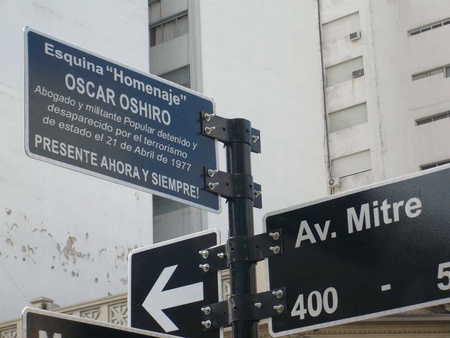
© 2017 Gaby Oshiro


